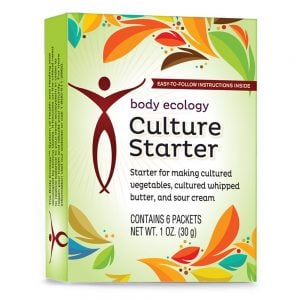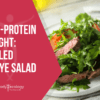How to Stop the Downward Spiral of a Leaky Gut
Under normal circumstances, inflammation encourages tissue repair and is short-lived.
What’s going on in your gut? Eating probiotic foods daily, like cultured vegetables made from the Veggie Culture Starter, can help to strengthen the gut wall.
But when the gut is chronically inflamed, there is no immediate threat and no end in sight. Instead, balance is lost. The relationship between intestinal cells, gut bacteria, and the immune system shifts.
We see this loss of balance (and chronic inflammation) in:
- Asthma
- Allergies
- Obesity
- Type 2 diabetes
- Atherosclerosis
- Some autoimmune disorders
- Neurodegenerative disorders, like dementia
What Is Leaky Gut?
Gut health is dependent on the health of your inner ecosystem, or the communities of microbes that live within the gut.
What happens when your inner ecosystem is overloaded with modern toxins or damaged by antibiotic use? This is when bad bacteria and yeast take over—making you feel progressively sicker and sicker.
For many, this downward spiral begins at a young age.
For example, maybe you were fed formula instead of breast milk. Or you were sick as an infant and given antibiotics. Or maybe as a child, your diet was made up of sterile, packaged foods.
Animal studies show that low levels of antibiotics—as much as you would find in conventionally farmed meat—early in life are enough to increase the risk of weight gain. Low levels of antibiotics also affect liver metabolism and cholesterol. (1) Other studies show changes in behavior and gene expression in the brain. (2)
2 Simple Steps to Fix Your Leaky Gut
Because gut bacteria have such a close relationship with your immune system and intestinal cells, the inner ecosystem is your target when healing a leaky gut. Your gut wall is more than a barrier. It’s the pathway that your gut bacteria and immune system use to hold conversation. (3)
You can strengthen your gut wall and soothe your immune system by supporting healthy communities of good gut bacteria:
- Eat Probiotic Foods.
Probiotic foods are foods that have been inoculated with good bacteria and then allowed to ferment. During the fermentation process, good bacteria consume the sugars in food and form robust communities.
When you eat probiotic foods like cultured vegetables and kefir, you escort these robust communities of probiotics into your colon, where they do the most good.
The most common strains of probiotic bacteria include Lactobacilli and Bifidobacteria, which have been shown to protect against the development of allergies. (4) In short, the good bacteria in probiotic foods help to balance the immune system and control the expression of pro-inflammatory messages.
- Eat Prebiotic Foods.
Prebiotic foods nourish healthy communities of gut bacteria. These are high-fiber foods that aren’t readily broken down by enzymes—but they are broken down in the colon by your gut bacteria.
As healthy gut bacteria consume fiber-rich foods, they produce short-chain fatty acids.
Short-chain fatty acids promote a healthy intestinal lining and give the right amount of stimulation to the immune system. (5) Overall, their impact is anti-inflammatory.
Examples of prebiotic foods include:
- Hearty green vegetables
- Starchy vegetables
- Grain-like seeds, such as quinoa, buckwheat, amaranth, and millet
When healing leaky gut, do your best to avoid processed and refined foods that lack fiber. Also, steer clear of conventionally raised animal products that contain traces of antibiotics.
Remember, ratios matter. You can optimize your digestion (and avoid bacterial overgrowth in the small intestine) by following Body Ecology’s principles of food combining.
What To Remember Most About This Article:
Inflammation in the body can be beneficial when it is short-lived and used for tissue repair. When the gut is chronically inflamed, digestive health suffers with no end in sight. This loss of balance due to chronic inflammation may appear as allergies, asthma, obesity, type 2 diabetes, or autoimmune disorders.
Restoring gut health can restore your quality of life. It truly is one of the most important things that you can do for your body.
If you suspect you may be plagued by an out-of-control leaky gut, put these tips into practice today:
- Eat more probiotic foods. Probiotic foods are rich in good bacteria that can support robust communities in the gut. Cultured vegetables and kefir help to balance the immune system and curb inflammation.
- Eat more prebiotic foods. Prebiotic foods are the next step—they nourish healthy communities of bacteria in the gut. High-fiber foods like hearty green vegetables, starchy vegetables, and grain-like seeds support a healthy gut lining and strengthen the immune system.
REFERENCES:
- Cho, I., Yamanishi, S., Cox, L., Methé, B. A., Zavadil, J., Li, K., … & Blaser, M. J. (2012). Antibiotics in early life alter the murine colonic microbiome and adiposity. Nature, 488(7413), 621-626.
- Sommer, F., & Bäckhed, F. (2013). The gut microbiota—masters of host development and physiology. Nature Reviews Microbiology, 11(4), 227-238.
- West, C. E., Jenmalm, M. C., & Prescott, S. L. (2014). The gut microbiota and its role in the development of allergic disease: a wider perspective. Clinical & Experimental Allergy.
- Goto, Y., & Ivanov, I. I. (2013). Intestinal epithelial cells as mediators of the commensal–host immune crosstalk. Immunology and cell biology, 91(3), 204-214.
- Bielory, L., Boyle, R. J., Cocco, R., Dreborg, S., Goodman, R., Kuitunen, M., … & Tannock, G. W. (2012). Clinical use of probiotics in pediatric allergy (CUPPA): a world allergy organization position paper.









